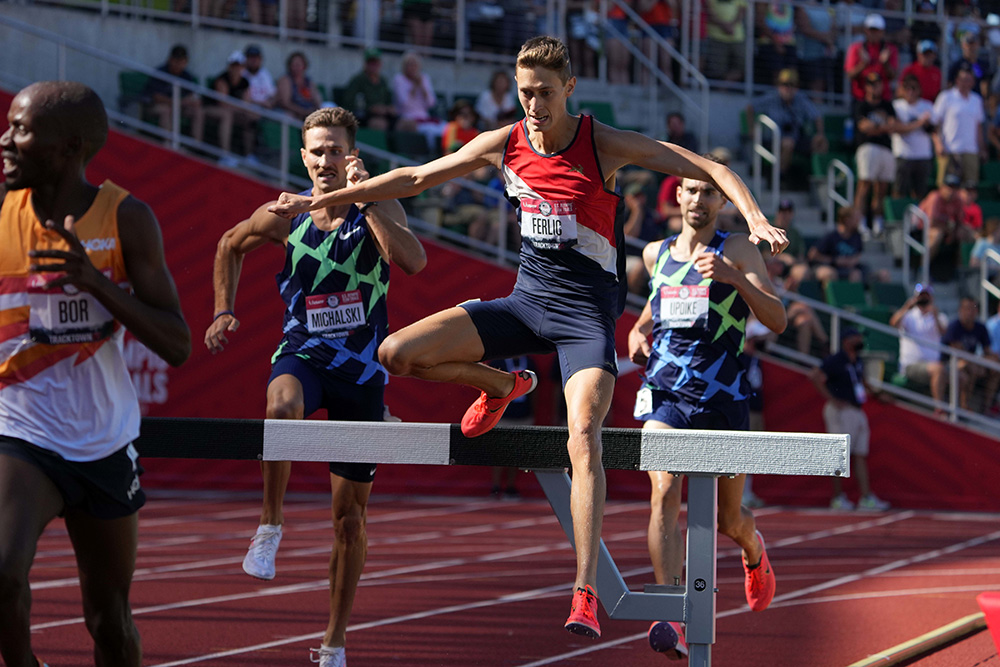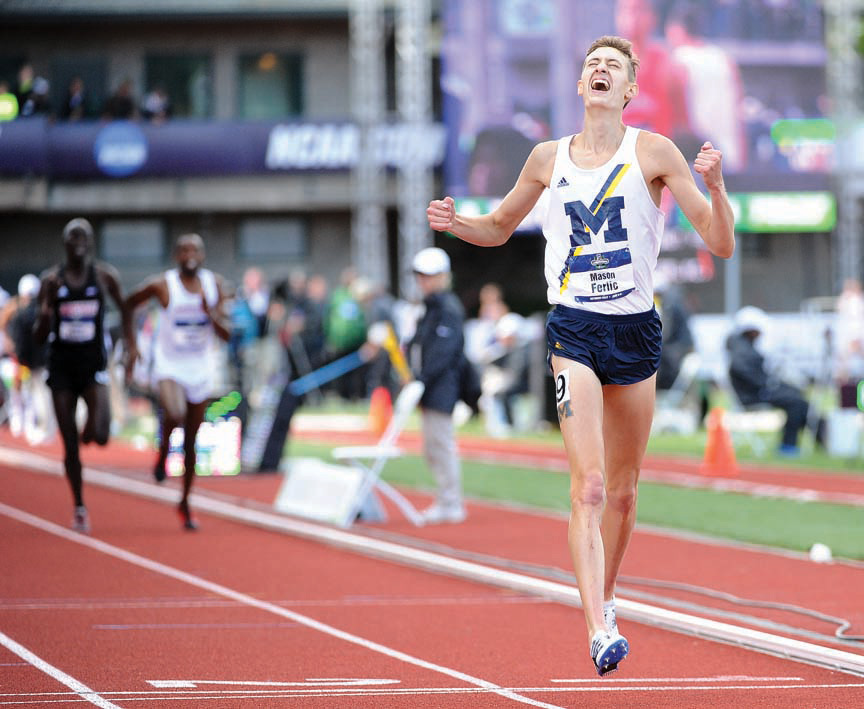
AFTER TOPPING ALL THE Americans — but losing to Canadian John Gay — in the steeple at the USATF Distance Classic, Mason Ferlic admits he wasn’t altogether pleased. “It was fine; nothing was wrong with it,” he says of his 8:25.41. “I just don’t feel like I competed very well. I was a little passive over the last two laps and it cost me challenging for the win. I’ve got to be a little more aggressive closing that last lap and not wait till the last water pit. I just ran out of real estate.”
Ever the analytical athlete, Ferlic feels he is poised, at age 28, to do the best running of his life. With the help of Ron Warhurst and his friends at the Very Nice TC, the Michigan doctoral student put together a ’21 season that saw him PR at 8:18.49 and make it to the Olympics, along the way hitting PRs of 3:35.45 and 13:24.94 on the flat.
Yet he and Warhurst saw things they might have done better and have timed their training a bit differently for ’22: “We’re in a great spot, we’re healthy. I got a good win under the belt at the Oregon Relays and another good race at Mt. SAC [in the Distance Classic]. I fell at Penn Relays, which was a little disappointing, but in terms of fitness overall, we’re probably like 2–3 weeks back compared to where we were last year.”
He points back to when he and training partner Hobbs Kessler ran their PR 1500s at the end of May last year: “We were lighting it up and things were clicking really, really well. I think maybe we mistimed things a little bit going into the Trials and post-season. So we’ve made a concerted effort to be keeping it a little more low-key in terms of the intensity, keeping the strength in the program, keeping the mileage a little bit up and not trying to get too ambitious or too race-sharp too early. We’ve tried to shift it so that it coincides better with U.S. Champs and Worlds. And that’s on track.”
Ferlic doesn’t have a complaint with how he ran at last summer’s Trials, placing 3rd in 8:22.05: “That was kind of the crescendo that we were building for. The experience in Eugene was one filled with relief, like, everything happened, I stayed on my feet… for it to come together the way I knew I could run and make the team was so much satisfaction.”
Tokyo, however, was a different story: dealing with the COVID protocols, not being allowed to go into Tokyo until a few days before the race, getting sick at a training camp in Hawai‘i en route. “I didn’t see the Olympic Stadium until I came out of the call room tunnel onto the track, 2:00 before the gun. You walk in and it’s a 60,000-seat stadium and it’s empty besides the volunteers, a couple press and the camera crew. I kind of feed off the energy and to have no one there, it was like a total mismatch of I’m pretty nervous, I’m about to run the Olympics, and it was emotionally flat. It felt like a time trial or a practice.”
He ran 8:20.23 in his heat, missing the final by a little less than 3 seconds. “I walked away and I was just like, ‘Wow! I wish I could redo that.’ I was fit enough to run much better, but the way things lined up, the body, the mind weren’t there… I wouldn’t say it soured me or anything. It gave me more motivation to go to Paris and have a redo.”
Two hours after his heat, he says, “I got an e-mail and they’re like, ‘Your flight’s booked to go home on Sunday.’ I’m like, ‘Wow! Pour salt on the wound!’ I remember flying home and watching the 800 prelims in the Chicago airport thinking, ‘I was literally there 15 hours ago.’ That is not how you expect things to end; it was maybe like a little bit of whiplash. I’m impressed with the people that ran really well, because for me, I found the environment hard to reach peak performance.”
Along the way to the Olympics as a pro, Ferlic found parallels with his college career. “I had rough years in college, for sure. I was DFL as a freshman in cross country [252nd at the ’11 NCAA], but by four years later as a senior, I win an NCAA title and go undefeated and win events across the Big 10s.

“The start of my professional career mirrored that. I was riddled with injuries, overtrained, didn’t know my place on the circuit or what I was capable of.
“But things progress and you get a little older and mature. That kind of coincided with the Very Nice Track Club and Ron and the rejuvenation of my career.” That came after Ferlic transitioned from the often solitary training he did as a post-collegiate with Michigan coach Kevin Sullivan, who had guided him to the ’16 NCAA title.
“Just having camaraderie totally renewed my outlook. We kind of took a step back; I needed some less-intense, more strength-based stuff. It turned things around and then we started to get back into a normal rhythm. It wasn’t drastically different.”
Training with 2-time Olympic 1500 medalist Nick Willis as well as wunderkind Kessler, Ferlic found himself at the center of a unique training pod. “I was actually chatting about this the other day with [Ben Flanagan, the newest VNTC member]. What our group offers that is extremely unique is a level of autonomy and trust on the athlete side that no other group really has.
“Ron is this forceful personality, I mean, he’s a character, right? He’s shooting from the hip, a little bit of a wildcard sometimes, but incredibly knowledgeable in the sport and also just a great person. His biggest talent is being able to read you as a person, whether that’s when you’re in the middle of a rep or when to call a workout or when to push hard; he knows how to motivate you in a way that’s not controlling.
“I think a lot of other pro groups — not to knock on them and maybe it obviously works for some athletes — they try to put on this charade of seriousness and eliteness that might work in American team sports, but running is so inherently individual and driven by internal motivation that having the coach trust you to make your own decisions and having autonomy works better, I feel, for the majority of people.
“I think our approach is different because we don’t pretend to be elite in any way, even though we are striving for elite performances and we recognize there’s elite talent, but it’s very organic. Having an ‘all-comers’ track club where it’s like, yeah, we run with guys that just want to join in for a 16M long run, that takes pressure off days when it doesn’t really matter. You can’t show up for practice every day and be like, this is going to have to be the best 16M you’ve ever run, you know?
“That’s not the point. It’s get some laughs in, chat with a buddy, catch up with people. And that’s the work that is the training for the day. I think the pro group scene is very attractive to someone right out of college where they see the Instagram version — ‘Oh, wow, that’s awesome!’ It’s very structured.”
He laughs. “I’m a pro runner. I want the most out of myself, but this lifestyle doesn’t preclude being serious. Here you can make your own decisions. Ron is here for guidance and support and expertise, but at the end of the day, we show up to practice because we want to show up, not because someone’s telling us to come to Ferry Field at 9 a.m.”
Furthermore, the loose structure of Warhurst’s group meshes perfectly with Ferlic’s academic pursuits. He has tongue-in cheek referred to himself as the “World’s Fastest Ph.D. Student.” Currently he’s finished his coursework and is embarking on the dissertation process in Statistics.
“My advisor is super understanding and excited about my running,” he says. “That helps. We’re working on precision medicine and adaptive interventions, which is all about optimizing treatment. My knowledge as an athlete aligns with what we want to do from a statistical research standpoint. It’s all about finding the best treatment or program or policy for individuals.”
That might seem like a lot to juggle with a world-class running career. Ferlic explains, “The ‘all-in’ attitude maybe works for some people, but I discovered it didn’t work for me. There is balance to be had. As we’re gearing up for the U.S. Champs, research is not elevated in terms of priority. But when the season’s over and we wind down and take a break in the fall, I’m going to be pretty locked into school and making strides on the research. And that is actually beneficial in both things, a little bit of periodization in lifestyle.”
But for the next few months, it’s all about the steeple. “I feel like I’m entering the prime of my career,” he says. “Last year was figuring out what made it click. Now it’s like, ‘Let’s keep on extending that momentum.’ I feel like I’m maturing into my body and the form that allows me to do better training. The strength’s getting better. The speed’s getting better.
“I’m turning 29, but feel stronger and healthier as an athlete than I’ve ever felt.”